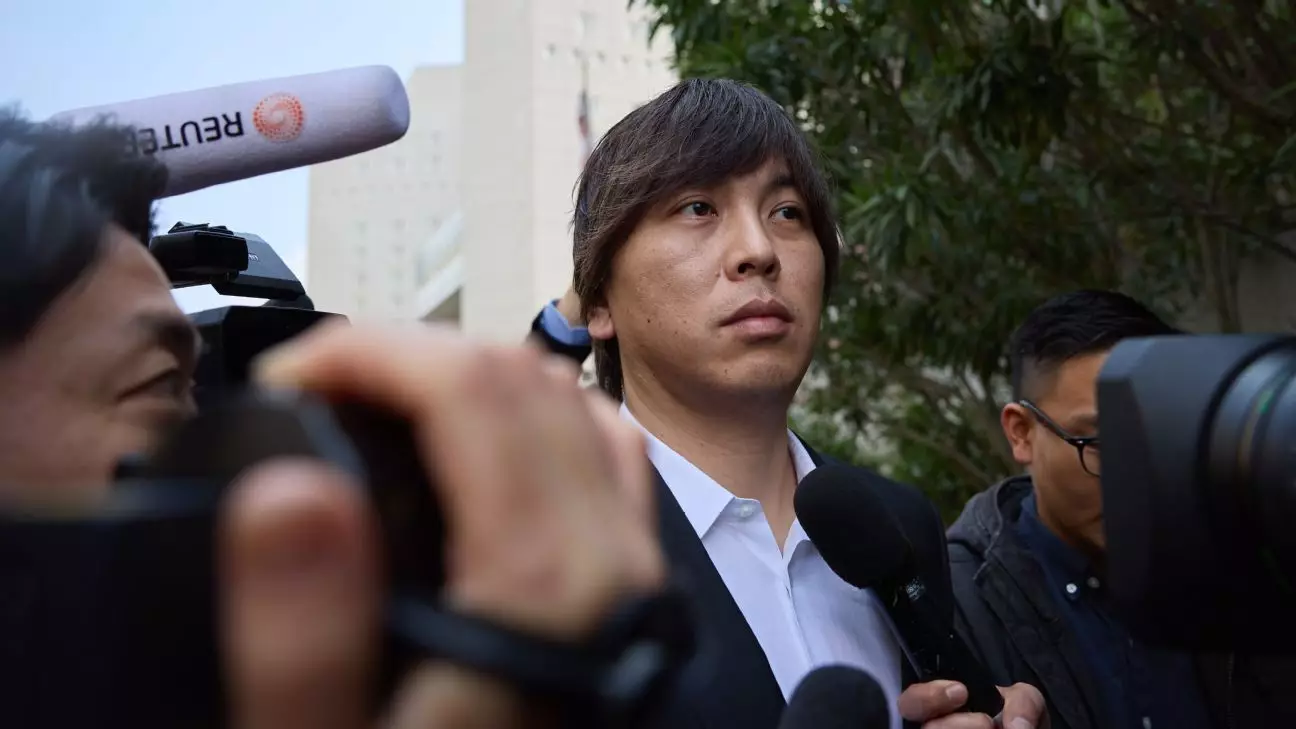In the world of professional sports, trust and loyalty are invaluable commodities, especially when successful athletes often rely on their support staff to manage not just their professional lives but also their personal finances. The case of Ippei Mizuhara, who served as the interpreter for Major League Baseball superstar Shohei Ohtani, starkly demonstrates how betrayal can unfurl in this tight-knit circle. Accused of stealing substantial sums from Ohtani, Mizuhara’s defense hinges on claims of gambling addiction; however, federal prosecutors appear to dismantle this narrative convincingly.
The crux of the claim against Mizuhara suggests he siphoned money from Ohtani’s accounts to alleviate what he labeled as “massive gambling debts,” asserting this gambling addiction had plagued him for years. In an ironic twist, prosecutors vehemently contested these assertions, affirming that substantial evidence points to Mizuhara’s alleged gambling behavior being minimal, if not entirely fabricated. This war of narratives reveals potential depths of deceit intertwined with addiction.
Mizuhara’s request for a lighter sentence rests on the premise of remorse and a supposed gambling addiction that drove him to commit the thefts. However, prosecutors counter this plea by underscoring the absence of documented gambling patterns that would support his claims of financial duress. They highlighted their exhaustive investigation, which only unearthed scant evidence of gambling, including a mere $200 spent at the Mirage casino dating back to 2008 and minimal activity on gambling platforms like FanDuel and DraftKings.
The prosecution also pointed out the fundamental contradiction in Mizuhara’s narrative—claiming to be living paycheck to paycheck while inadvertently revealing a solid financial standing, which included more than $34,000 in his bank account at the time of the initial fraudulent transactions. The evidence posed raises pertinent questions regarding Mizuhara’s intentions and whether these acts of theft were rooted in desperation or a calculated choice informed by greed.
Diving into the financial details that prosecutors presented provides a clearer picture of Mizuhara’s economic circumstances. Despite arguments to the contrary, evidence pointed towards a rather comfortable financial situation. His bank statements indicated significant funds, showing that he effortlessly maintained a balance exceeding $30,000 during crucial times, even managing to accumulate over $195,000 just months prior to an inquiry that led to the unmasking of his deceit.
Furthermore, documents highlighted Mizuhara’s dubious claims about his living expenses, including alleged hefty rent payments in California while simultaneously maintaining an apartment in Japan. Prosecutors exposed these statements as unfounded, alleging that Mizuhara had used Ohtani’s resources without consent, betraying not just trust but also legal boundaries in his financial dealings.
Central to the ongoing discourse surrounding Mizuhara’s culpability is the level of accountability he demonstrates. Prosecutors contend that many threads in his story lack authenticity. Their statements imply that Mizuhara’s expressions of remorse might be less about acknowledging the gravity of his crimes and more about lamenting the repercussions of being caught. This assertion poses existential reflections on the nature of remorse, questioning whether genuine regret can coexist with attempts to downplay consequences through misguided narratives.
Furthermore, the prosecutors argue that Mizuhara rejected lucrative book and commercial deals offered by Ohtani, which complicates the allegation of a ‘needy individual’ driven to desperate measures. This refusal hints at a level of professionalism and personal pride that contradicts his claims of being overwhelmed by gambling debts, raising suspicions about the genuineness of his plight.
The circumstances surrounding Mizuhara not only spotlight a compelling legal battle but raise broader discussions regarding trust in professional environments. Betrayal by someone tasked with safeguarding an athlete’s interests reverberates beyond the immediate financial implications, anchoring deeper questions about the layers of trust inherent within professional and personal relationships.
As Mizuhara moves toward his sentencing scheduled for February 6, the responses and allegations exchanged in court reflect the intricacies of human behavior intertwined with financial dealings and personal ethics. This saga serves as a proverbial cautionary tale, emphasizing how swift misjudgments and betrayals can dramatically alter both personal and professional landscapes. Ultimately, this case goes beyond individual accountability, shining a harsh light on the ripple effects of trust violations in the very fabric of professional sports.


Leave a Reply